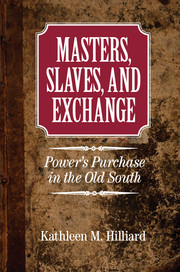Introduction
Published online by Cambridge University Press: 05 June 2014
Summary
There was nothing unusual about the transactions: four sales – tobacco, a fine tooth comb, calico, and sugar – listed in sequence. Others bought more or less that day in early March 1855 – a bunch of twine, an assortment of hats, a box of caps. The clerk who logged the day’s business surely recognized the purchasers, as the store’s daybook listed their names several times before. Often grouped together in the ledger, they showed up once or twice a week. Elijah, Mattison, Dick, and Giss were regular customers.
Of these men, we know little more. Their names do not appear in census rolls. They left no memoirs. No wills or probate documents explicate their identity or achievements at death. The tattered pages of storekeeper Stephen McCulley’s daybook from Anderson, South Carolina, offer the most lasting history of these men’s lives. Yet these records hint at key relationships and vital choices enacted both in Anderson and across the Old South. The surnames appearing next to those four transactions did not belong to the buyers of goods. Mr. Bailey, Mr. Boaseman, Mr. McCulley, and Col. Sanders claimed those names and, tragically, the men themselves. Elijah, Mattison, Dick, and Giss were slaves, people called property, discovered here in the undeniably human act of commodity exchange.
- Type
- Chapter
- Information
- Masters, Slaves, and ExchangePower's Purchase in the Old South, pp. 1 - 14Publisher: Cambridge University PressPrint publication year: 2013



